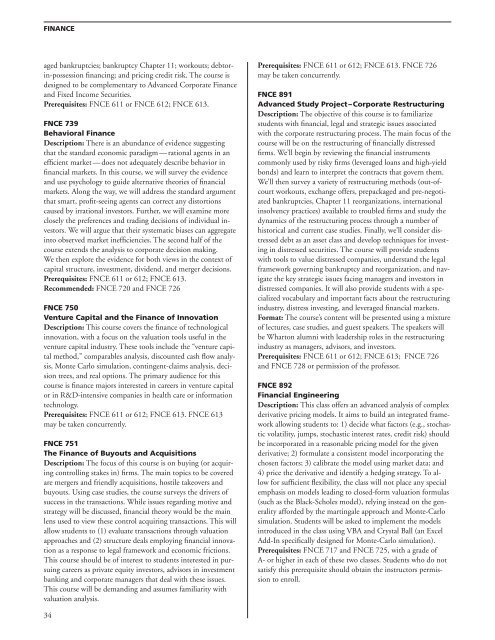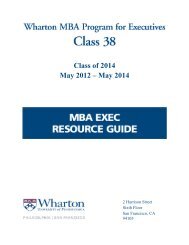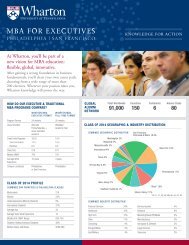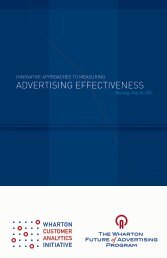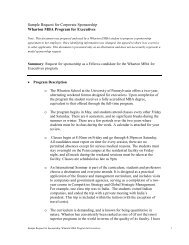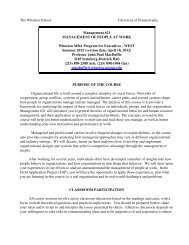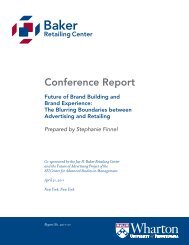Explore Options; Plan Your MBA Academic Program
Explore Options; Plan Your MBA Academic Program
Explore Options; Plan Your MBA Academic Program
Create successful ePaper yourself
Turn your PDF publications into a flip-book with our unique Google optimized e-Paper software.
FINANCE<br />
aged bankruptcies; bankruptcy Chapter 11; workouts; debtorin-possession<br />
financing; and pricing credit risk . The course is<br />
designed to be complementary to Advanced Corporate Finance<br />
and Fixed Income Securities .<br />
Prerequisites: FNCE 611 or FNCE 612; FNCE 613 .<br />
FNCE 739<br />
Behavioral Finance<br />
Description: There is an abundance of evidence suggesting<br />
that the standard economic paradigm — rational agents in an<br />
efficient market — does not adequately describe behavior in<br />
financial markets . In this course, we will survey the evidence<br />
and use psychology to guide alternative theories of financial<br />
markets . Along the way, we will address the standard argument<br />
that smart, profit-seeing agents can correct any distortions<br />
caused by irrational investors . Further, we will examine more<br />
closely the preferences and trading decisions of individual investors<br />
. We will argue that their systematic biases can aggregate<br />
into observed market inefficiencies . The second half of the<br />
course extends the analysis to corporate decision making .<br />
We then explore the evidence for both views in the context of<br />
capital structure, investment, dividend, and merger decisions .<br />
Prerequisites: FNCE 611 or 612; FNCE 613 .<br />
Recommended: FNCE 720 and FNCE 726<br />
FNCE 750<br />
venture Capital and the Finance of Innovation<br />
Description: This course covers the finance of technological<br />
innovation, with a focus on the valuation tools useful in the<br />
venture capital industry . These tools include the “venture capital<br />
method,” comparables analysis, discounted cash flow analysis,<br />
Monte Carlo simulation, contingent-claims analysis, decision<br />
trees, and real options . The primary audience for this<br />
course is finance majors interested in careers in venture capital<br />
or in R&D-intensive companies in health care or information<br />
technology .<br />
Prerequisites: FNCE 611 or 612; FNCE 613 . FNCE 613<br />
may be taken concurrently .<br />
FNCE 751<br />
The Finance of Buyouts and Acquisitions<br />
Description: The focus of this course is on buying (or acquiring<br />
controlling stakes in) firms . The main topics to be covered<br />
are mergers and friendly acquisitions, hostile takeovers and<br />
buyouts . Using case studies, the course surveys the drivers of<br />
success in the transactions . While issues regarding motive and<br />
strategy will be discussed, financial theory would be the main<br />
lens used to view these control acquiring transactions . This will<br />
allow students to (1) evaluate transactions through valuation<br />
approaches and (2) structure deals employing financial innovation<br />
as a response to legal framework and economic frictions .<br />
This course should be of interest to students interested in pursuing<br />
careers as private equity investors, advisors in investment<br />
banking and corporate managers that deal with these issues .<br />
This course will be demanding and assumes familiarity with<br />
valuation analysis .<br />
34<br />
Prerequisites: FNCE 611 or 612; FNCE 613 . FNCE 726<br />
may be taken concurrently .<br />
FNCE 891<br />
Advanced Study Project – Corporate Restructuring<br />
Description: The objective of this course is to familiarize<br />
students with financial, legal and strategic issues associated<br />
with the corporate restructuring process . The main focus of the<br />
course will be on the restructuring of financially distressed<br />
firms . We’ll begin by reviewing the financial instruments<br />
commonly used by risky firms (leveraged loans and high-yield<br />
bonds) and learn to interpret the contracts that govern them .<br />
We’ll then survey a variety of restructuring methods (out-ofcourt<br />
workouts, exchange offers, prepackaged and pre-negotiated<br />
bankruptcies, Chapter 11 reorganizations, international<br />
insolvency practices) available to troubled firms and study the<br />
dynamics of the restructuring process through a number of<br />
historical and current case studies . Finally, we’ll consider distressed<br />
debt as an asset class and develop techniques for investing<br />
in distressed securities . The course will provide students<br />
with tools to value distressed companies, understand the legal<br />
framework governing bankruptcy and reorganization, and navigate<br />
the key strategic issues facing managers and investors in<br />
distressed companies . It will also provide students with a specialized<br />
vocabulary and important facts about the restructuring<br />
industry, distress investing, and leveraged financial markets .<br />
Format: The course’s content will be presented using a mixture<br />
of lectures, case studies, and guest speakers . The speakers will<br />
be Wharton alumni with leadership roles in the restructuring<br />
industry as managers, advisors, and investors .<br />
Prerequisites: FNCE 611 or 612; FNCE 613; FNCE 726<br />
and FNCE 728 or permission of the professor .<br />
FNCE 892<br />
Financial Engineering<br />
Description: This class offers an advanced analysis of complex<br />
derivative pricing models . It aims to build an integrated framework<br />
allowing students to: 1) decide what factors (e .g ., stochastic<br />
volatility, jumps, stochastic interest rates, credit risk) should<br />
be incorporated in a reasonable pricing model for the given<br />
derivative; 2) formulate a consistent model incorporating the<br />
chosen factors; 3) calibrate the model using market data; and<br />
4) price the derivative and identify a hedging strategy . To allow<br />
for sufficient flexibility, the class will not place any special<br />
emphasis on models leading to closed-form valuation formulas<br />
(such as the Black-Scholes model), relying instead on the generality<br />
afforded by the martingale approach and Monte-Carlo<br />
simulation . Students will be asked to implement the models<br />
introduced in the class using VBA and Crystal Ball (an Excel<br />
Add-In specifically designed for Monte-Carlo simulation) .<br />
Prerequisites: FNCE 717 and FNCE 725, with a grade of<br />
A- or higher in each of these two classes . Students who do not<br />
satisfy this prerequisite should obtain the instructors permission<br />
to enroll .


